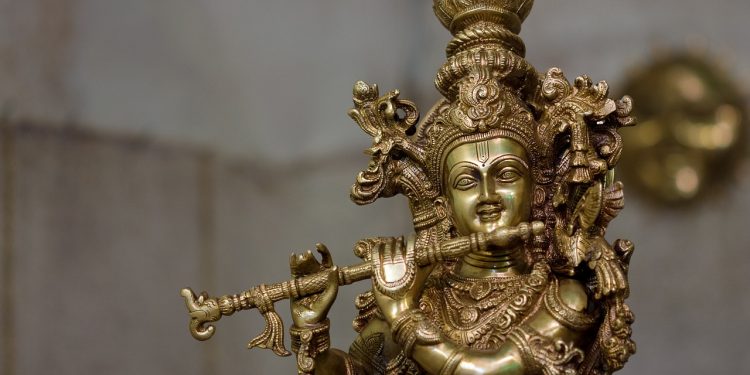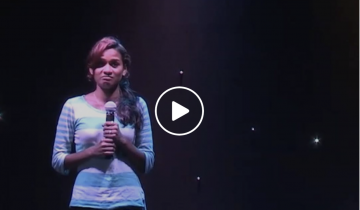When Religion Decides Politics: Is This Titanomachy?

The Current State Of Politics
‘Loyalty to the country – always. Loyalty to the government – only when it deserves it.’ These wise words of Mark Twain come to us when we think of the situation of Indian politics in today’s world. While the current central government has undertaken some quite exceptional steps and has had a fresh change from the knavish and fraudulent officials of the NDA government, we can’t help but notice the amount of importance being given to one’s religious affinity over national identity. Incidents like the recent furore over which register Rahul Gandhi signed in as at the Somnath Temple bring this phenomenon into the light. The BJP has asked Rahul Gandhi to establish his credentials as to whether he is a Hindu or a non-Hindu, choosing to overlook the fact that his religious identity should in no way affect his political appeal. BJP spokesperson Sambit Patra has said that Rahul Gandhi should ‘say who he really is’. In response, Congress released a picture of Rahul Gandhi with a janeu to establish that he is a janeu-dhari Hindu. The most alarming issue about this debate is the casual way in which both the parties are arguing over a politician’s said ‘Hindu’ness as if being non-Hindu is equivalent to being insignificant. The fact that the BJP would take a dig at a politician’s religious identity speaks volumes about them. With the elections in Gujarat, what the BJP leaders imply is that if he himself is not a Hindu, then Rahul Gandhi has no right to ask for the votes of Hindus in Gujarat. Sadly, this isn’t a one-time thing. We have seen the standard of politics in India steadily deteriorating. It has become simply about acquiring vote banks and appealing to citizens in the name of religion and region. The Republic of India is statedly secular, as are its major institutions. Whether they uphold this secularism is a matter of debate, but they are constitutionally bound to uphold such values. The government or different political parties cannot appeal to citizens based on religion, caste, or any other grounds, as declared by the constitutional bench of the Supreme Court. Even as the Prime Minister lauds the diversity and plurality of India in his extravagant speeches, the writing on the wall is that the past four years have seen a rather rightist shift in the policies of our country – be it the beef ban, Ghar Wapsi of Muslim artists or the arrest of JNU student-protesters.
Whose Fault Is It?
It is an agreeable fact that the BJP government has not responded actively to the different cases of communal unrest in the country. The beef lynchings are but one example of atrocities being committed in the name of religion. In Maharashtra, MP Rajan Vacherie, unsatisfied with the quality of food being provided in the Maharashtra Sadan, force-fed a Muslim waiter who was fasting for Ramzan. This typical Shiv Sainik behavior has been on the rise, with MP Gaikwad physically assaulting an Air India staffer who denied him access to a particular seat. The government, by taking a lenient approach to such issues, is only giving incentive to rowdy Hindutva fanatics to get away with condemnable actions such as this. Giving the RSS and Shiv Sena and other right-wing organizations free rein to establish a Hindutva nation seems to be BJP’s way of uniting India. A thin but sharp line has been drawn between the Hindus and the non-Hindus in the country and Hinduism has somehow become superior. Continuous attacks and threats against Muslims in India have marginalized the community, and relentlessly undermined the constitutional safeguards on which the secular Indian democracy has rested. The wildly misleading fact that Hindus and Muslims in India are at loggerheads with each other is something the politicians of today have built upon. Agreed that the BJP is an essentially right-wing party, however, constitutionally it is forbidden from framing policies in a way that threaten the secularism of the nation. It cannot marginalize any religious community and it definitely cannot dictate their behavior. The Indian constitution states that the state and religion must maintain principled distance, however, the line after which the state stops interfering in religious affairs has been blurred by the recent government’s actions. While the government has not openly stated its affiliation to Hinduism, it is abundantly clear by the groups it supports ( RSS, Shiv Sena ) that India is moving towards becoming a Hindu-favored nation. Cultural heterogeneity will not be tolerated and Muslims and other minorities shall be tolerated only as long as they understand their place in society. Any attempt to disagree with the government shall be branded as anti-nationalism and dissuaded. At the rate this government is going, instead of a Hindu Rashtra, India will be the world’s largest failed state.
Why Is It Bad For The Country?
A government that is openly contemptuous of protecting rights and stifles any dissent to its policies is not the finest example of the exercise of India’s democracy. We cannot progress, we cannot develop if people’s voice is not heard. It is shameful to see that politics and governing currently has been reduced to an exchange of accusations and wordplay between parties. Using India’s religious and regional diversity as the scapegoat for their political agenda simply to gain a few votes completely goes against everything the Indian Constitution stands for. The recent Babri Masjid case is an exceptional example of the State interfering in religious matters and how it led to communal violence and conflicts. The BJP cannot demand a Ram temple to be built on the site of the Babri Masjid if it wishes for the conflicts between Hindus and Muslims to minimise. Simply appealing to the Muslim voters during elections for vote banks and then going against their wishes after the election is won seems to be the modus operandi of politicians today. Constant chant of ‘Vasudaiva Kutumbakham’ by Indian politicians is not going to hide the bitter truth that religion is being given more importance in the political scenario. But this is the time for Indian citizens to speak up. We may be Hindus, Muslims, Sikhs, Christians or Jews as individuals – or we may choose to be none of these. But as far as the country is concerned, we are first and foremost Indian citizens and that should be our primary identity. For all the different communities in India to continue living in harmony, there are some compromises to be made. Even if our leaders do not think of the greater good, we must. And as far as elections are concerned, even before our national identity comes our moral identity. We are humans and humanity resides within each and every one of us. And as humans, we are more than capable of deciding who is good enough to rule us without depending on any external factors. Seven decades ago, when we got our independence, our forefathers had promised equal treatment and respect to all communities – it is high time we start living up to that promise.




